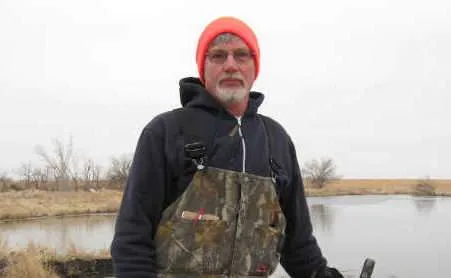Ah, the exuberance of youth! A couple years back, I trapped coyotes for a couple weeks before deer firearms season in early December, with the poorest results since I was a beginning trapper. Meanwhile a young lad I mentored the year before continued to send me picture after picture of coyotes and bobcats he was catching. In the 2 ½ weeks I trapped, I caught only 5 coyotes and had to leave 4 properties because the landowners fenced them for grazing or knifed-in nitrogen while I had traps there. I also seemed to enjoy trapping coyotes less that year than I can ever remember because the ground was so terribly hard and dry, making it miserable to get traps anchored in the cement-like soil and making it nearly necessary to extract them from the ground without a crane.
My young friend was evidently doing things correctly while I was not, so I deduced maybe it was time for the teacher to become the student again, so I rode along with him one morning to observe. For starters he was trapping on the outskirts of a major town on properties that have not been trapped for years, if ever, so the predator population was high, plus his exuberance for trapping was almost overwhelming. He didn’t care less that the ground was hard or frozen or about any other roadblocks nature had thrown his way, he just loved to trap!
This all got me thinking about the process of mentoring someone and teaching them what we know about a sport we love, so allow me to offer some observations I’ve collected. Most important by far is to make sure the persons introduction to the sport is a good experience. If a person’s first time fishing is in a pond where they catch no fish, and they get snagged on tree limbs and rocks with every cast, they have good reason not to go again. I remember one morning when I was to go goose hunting with a couple guys. They texted me before I left and asked my opinion about postponing the hunt since it was 11 degrees below zero. I said that was OK with me, but I would still go if they wanted. Then they told me that a young son wanted to go along and they felt it was just too cold for him. Sometimes concessions must be made to help someone enjoy your sport. Joyce and I built a nice elevated deer blind a few years back, but I don’t know if I would have built it had she not wanted to hunt too. She sometimes reminds me of the first time I took her deer hunting. It was in southwest KS and she’d decided to sit with me one evening. She had no intention of EVER hunting deer, but decided she would tag along just to be there. We sat in a patch of weeds on a couple small camp chairs overlooking a draw in a pasture. Just before dusk, I told her to watch the top of a certain hill in the distance, and right on cue, mule deer began popping over the top of that hill and heading into the draw below us. She tells me she was dumbfounded that I knew that would happen, and she’s been a deer hunter ever since, harvesting several nice Kansas whitetails. So, making the necessary concessions or arrangements to make a person’s first hunt, fishing trip or campout a good experience for them will go a long way toward ensuring that person will stick with their chosen sport for life.
An important detail to learn about a person you might mentor is how they learn the best. Some of us learn best by doing, some of us learn best by being shown, and some of us learn best by a combination of the two. Making use of the best learning process for the person will make it easiest for them to learn basic skills they’ll need to be successful at the sport you’re teaching them. I learn best by being shown, something a few times before I try it on my own. When teaching my young trapping friend what I knew about trapping, he told me right up front he learned best by doing, so I showed him very little, but talked him through most everything while he actually did it himself. It’s OK to help your protégé prevent mistakes, but missing a shot at a strutting tom turkey because they shot before you recommended, or losing a big fish because they failed to use the net like you suggested is all part of the learning process for them, and they’ll never make that mistake again.
I also feel it’s of utmost importance to talk to people about God’s Creation while you teach them to hunt, fish, and trap or in any way enjoy the outdoors. Tell them about things you see around you, explain how nature works and why the animals they harvest are made like they are or why they do what they do. My wife shakes her head and laughs at me in total disagreement when I tell her I’m not competitive, but if the sport you’re teaching someone involves harvesting game, try to instill in them the enjoyment and appreciation of having the opportunity and freedom to do so, even when they fail to harvest their quarry.
So there, for what it’s worth you have my two cents about mentoring. The only way our outdoor sports will continue to be enjoyed is by passing our love of them down to the next generation. Oh, and one more thing, try to be happy when your protégé out-hunts or out-traps you. It’s easy for me because I’m not competitive, remember? Take someone outdoors with you and help them learn to Explore Kansas Outdoors!
Steve can be contacted by email at stevenrgilliland@gmail.com.





